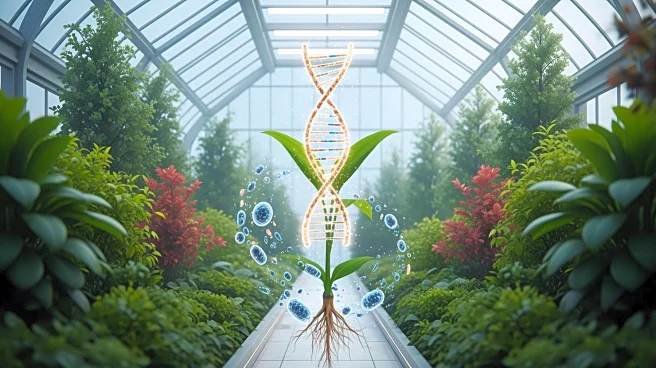What's Happening?
The agriculture biotechnology market is experiencing significant growth, projected to expand from USD 92.19 billion in 2025 to USD 144.25 billion by 2030, at a compound annual growth rate (CAGR) of 9.4%.
This growth is driven by advancements in genetic engineering, genome editing, and microbial biotechnology. Key players in the market include Bayer Crop Science, Corteva Agriscience, and Lallemand Plant Care. The market is bolstered by the increasing adoption of genetically modified crops that offer high yields, pest resistance, and climate resilience. Additionally, microbial biotechnology is gaining traction due to the demand for biofertilizers and biocontrol agents as eco-friendly alternatives to chemical inputs. North America is expected to dominate the market, supported by advanced R&D infrastructure and regulatory frameworks.
Why It's Important?
The expansion of the agriculture biotechnology market is crucial for addressing global food security challenges as the world population approaches 10 billion by 2050. Biotechnology offers solutions for sustainable food production, reducing environmental impact, and enhancing crop resilience to climate change. The adoption of genetically modified crops and microbial technologies can significantly reduce chemical dependency in agriculture, promoting environmental sustainability. This growth also presents economic opportunities for agribusinesses and biotech companies, driving innovation and competitiveness in the sector. The U.S., with its robust biotech industry, stands to benefit from increased investments and advancements in agricultural technologies.
What's Next?
The agriculture biotechnology market is expected to continue its growth trajectory, with North America maintaining its leadership position. The focus will likely remain on developing climate-resilient and sustainable agricultural practices. Companies are expected to invest further in AI-integrated biotechnology and synthetic biology to enhance productivity. Regulatory bodies may also play a role in facilitating the adoption of new biotechnologies by ensuring biosafety and supporting innovation. The market's evolution will be closely watched by stakeholders, including farmers, agribusinesses, and policymakers, as they adapt to the changing landscape of agricultural production.
Beyond the Headlines
The rise of biotechnology in agriculture raises ethical and regulatory considerations, particularly concerning genetically modified organisms (GMOs) and their impact on biodiversity. There is also a cultural dimension, as public perception and acceptance of GMOs vary globally. The integration of AI and biotechnology could lead to significant shifts in agricultural labor markets, requiring new skills and training for workers. Long-term, the success of these technologies will depend on balancing innovation with ethical considerations and public trust.









